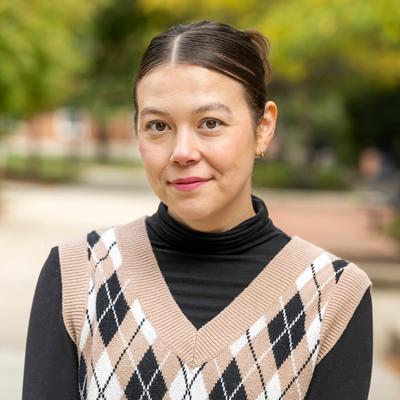Data Justice
Information, analytics and computing for social change
Introduction
Data Justice (DJ) provides students an opportunity to interrogate the biases that are built into information collection, design, and analysis. Students explore how specific values are coded into datasets, algorithms, AI-driven systems, machine learning models, and other sociotechnical systems. They gain advanced data-related skills that will serve them in a wide variety of careers that aim to make the world a better place through information.
By the conclusion of the program, students will be able to:
- Employ justice-centered approaches to equitable computer and data sciences;
- Analyze how cultural values, power, and privilege are encoded into technologies;
- Critique the sociopolitical values of data structure and algorithmic design;
- Analyze ways that computing and data science have been used as a catalyst for positive social change; and
- Develop a computing identity that intersects with personal identity factors.
DJ Scholars enters its second academic year in 2025-26. The program is sponsored by the University of Maryland’s College of Information, a top-ranked research and teaching college in the field of information science.
In the College of Information, faculty, staff, students, and partners are expanding the frontiers of how information and technology are accessed and used in a rapidly evolving world. We are combining principles of information science with cutting-edge technology to foster access to information, improve information interfaces, and expand how information is used in an evolving world.
Throughout all of our endeavors, the College of Information is committed to utilizing information and technology for good – to connect communities, empower individuals, and create opportunities.
Colloquium and Lecture Topics
- How do you use information?
- What is the info you need to change the world?
- What has produced the digital divide?
- How are digital identities different from personal identities?
- How can we achieve information justice?
The Data Justice program will be an excellent opportunity for undergraduate students interested in information science, computer science, the social sciences, journalism, business, policy, and more.
Other Learning Opportunities
In addition to colloquium and supporting courses, DJ students will choose three 1-credit electives from a group of courses focused on building technical computing and data science skills. Course titles include:
- Making Twitter Bots
- Solving Puzzles and Riddles with Computation
- Comic Books and Machine Learning
- Emergent Experiences through Technology
Off-campus excursions to information-related sites, such as the Library of Congress, the National Archives, and the Agricultural Library in Beltsville, MD, will foster community and encourage examination of information in the community (in physical location, cyberspace, and institutions created for the management and best use of information).
Curriculum Overview
Data Justice is an 15-credit program that includes a required course on algorithmic bias (INST204S); a series of colloquium courses on the topics of the digital divide, digital identities, and information justice; a set of supporting courses drawn from the College of Information’s 100- and 200-level courses on relevant current issues; a set of short supporting courses focused on technical computing and data science skills; and a practicum (CPDJ240 Service Learning) in which students will undertake a project with a community partner related to data justice.
The following table represents a typical two-year curriculum, but individual schedules will vary. Details about courses and requirements can be found on the Data Justice Citation Checklist.
| SEMESTER | COURSE | CREDITS |
|---|---|---|
| Semester 1 | CPDJ 100: Colloquium I | 1 credit |
| INST204S: Designing Fair Systems (DSHS, SCIS) | 3 credits | |
| Semester 2 | CPDJ 101: Colloquium II | 1 credit |
| Semester 3 | CPDJ 200: Colloquium III | 1 credit |
| Semester 1, 2, 3, or 4 | INST 388: Maker Movement INST 388: Maker Movement INST 388: Maker Movement |
1 credit 1 credit 1 credit |
| Semester 1, 2, 3, or 4 | Supporting Course (var. Gen Ed) | 3 credits |
| Semester 4 | CPDJ 240: Service-Learning Practicum | 3 credits |
Sponsoring College
Office Address
1101 Centreville
Office Phone
TBD
Faculty


News and Notes, Etc.
6 Scholars Alums Selected to Serve as Spring Commencement Senior Marshals
The University of Maryland has announced its senior marshals for Spring Commencement, slated for Friday, May 20. Six College Park Scholars alumni number among the 60 graduating seniors serving as marshals:
4 Graduating Scholars Alums Recognized With Prestigious University Awards
Four Scholars alumni are among the handful of graduating seniors recognized this month with some of the University of Maryland’s most prestigious awards. Gabriela Winter, an alum of the Public Leadership Scholars program, received the Wilson H. Elkins Citizenship Awards, presented each year to one of the top students in the graduating class who has displayed outstanding involvement and leadership in campus activities.
GPH Director Receives Award for Excellence in Undergraduate Teaching
Dr. Lis Maring (middle), director of the Global Public Health Scholars program, poses with Dean William Cohen, associate provost and dean for Undergraduate Studies, and Samantha Miller, one of the students who nominated her for the Donna B. Hamilton Teaching Award for Excellence in Undergraduate Studies. PHOTO: Thai Nguyen Dr.
Course provides safe space to unpack power, privilege
When Michelle Pinkrah strolled into her first Thursdays-at-3:30 p.m. class of the semester in late January, she had no idea what she’d signed up for. She had signed up by accident, actually. The class wasn’t her first choice for her practicum course requirement with College Park Scholars, where she is a student, and she’d quickly forgotten it was even on her schedule. Pinkrah sat down in the circle of her peers and encountered something she hadn’t expected: a dialogue class, or, a class that centers around group discussion of life and experiences.
Making Tough Conversations a Little Easier
The following article originally appeared in Maryland Today: You might feel the attentiveness—or lack of it—of a doctor listening to you describe your symptoms, based on your accent. Or the eyes on you when you take your seat in a lecture hall full of people with skin tones different than yours. Or the fear when you’re driving while Black and realize your taillight is out. In ways big and small, social identity molds our individual experiences, often making it difficult to explain ourselves to people who don’t share our backgrounds and worldviews.
Scholars Student 1 of 6 Terps to Receive 2022 Hollings Scholarship from NOAA
An Environment, Technology and Economy (ETE) Scholars student has received a 2022 Ernest F. Hollings Undergraduate Scholarship from the National Oceanic and Atmospheric Administration (NOAA). Maguire Ballard, a civil engineering major in his second year of ETE, is one of six University of Maryland students to have received this year's Hollings Scholarship. The award is NOAA's flagship undergraduate program and provides recipients with scholarships worth $19,000 and a fully funded 10-week, full-time summer research placement at a NOAA facility.


